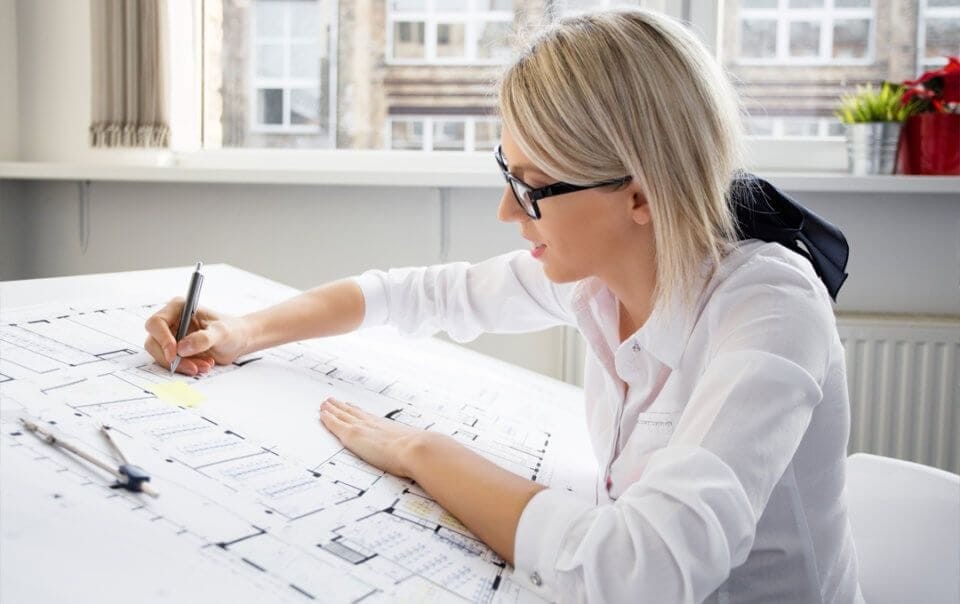Architect Collaboration Tips for Working with Consultants and Builders
Architect Collaboration Tips for Working with Consultants and Builders
Blog Article
Discover the Vital Skills and High Qualities Every Architect Should Possess
As an architect, you understand that success in your field surpasses simply technological skills. It has to do with mixing imagination with usefulness, fostering collaboration, and managing jobs effectively. Each top quality plays an essential role in your capability to make rooms that influence and function well. What are the particular skills that can really establish you apart? Allow's discover the important attributes every Architect should cultivate to prosper in this ever-evolving career.
Creativity and Advancement
Creativity and advancement are at the heart of design, driving the design of areas that influence and work flawlessly. You'll continuously check out brand-new products, methods, and technologies to improve your styles.
You'll additionally attract motivation from numerous resources-- nature, art, and also everyday life can stimulate fresh ideas. This capability to mix creativity with practicality allows you to address intricate problems, guaranteeing your layouts fulfill both practical and visual needs.
Strong Communication Skills
While making amazing rooms calls for creativity, solid communication abilities are just as critical for engineers. You require to share your concepts plainly to clients, professionals, and group participants. Listening is just as important; understanding your client's vision helps you create styles that genuinely meet their needs.
You'll usually have to discuss complicated principles in a manner that's simple to grasp, whether you're offering a proposition or talking about products. Reliable communication promotes cooperation, guaranteeing everyone is on the same web page throughout the project.
Structure partnerships is necessary, as well. When you develop count on and connection, clients are most likely to share their issues and comments, leading to much better outcomes.
Lastly, don't ignore the power of body movement and visual aids. They can enhance your message and make your discussions extra appealing. Strong interaction abilities not just boost your layouts however additionally enhance your specialist connections in the building globe.
Technical Effectiveness in Design Software Program
As you browse the ever-evolving world of design, grasping style software comes to be important for translating your imaginative concepts right into substantial plans. Familiarizing yourself with programs like AutoCAD, Revit, and SketchUp will certainly not only improve your layout capabilities yet also simplify your workflow. These tools enable you to create detailed illustrations, 3D designs, and even simulations that can help you picture and present your concepts a lot more effectively.
Being efficient in these software applications also enhances your collaboration with specialists and designers, as everybody can work from the same electronic foundation. Furthermore, your capability to adapt to new technologies will keep you affordable in the field. Regularly upgrading your skills and exploring new features can set you in addition to your peers, ensuring your designs are cutting-edge and accurate. Inevitably, technical efficiency in style software is a foundation of effective architecture, aiding you bring your visions to life.
Understanding of Design Concepts

Recognizing design principles also allows you to prepare for possible challenges early in the layout procedure. When you understand how different products behave under numerous problems, you can make enlightened selections that boost your styles. Your layouts ought to not only be visually pleasing however lasting and additionally functional.
In addition, a strong understanding of engineering concepts permits you to innovate within restraints. You can push imaginative boundaries while still adhering to safety requirements. Ultimately, this understanding enriches your building method and establishes you apart in a competitive area.
Task Monitoring Talents
Reliable task monitoring capacities are essential for engineers, allowing you to supervise all facets of a project from conception to completion. You'll require to collaborate with numerous stakeholders, consisting of clients, professionals, and designers, ensuring everyone's on the same web page. Establishing clear goals, timelines, and budgets is basic; it aids you keep the task on the right track and within range.
As an architect, you ought to additionally be proficient in jeopardy monitoring, identifying potential problems before they escalate. Strong interaction skills are very important, allowing you to express your vision and motivate your team. You'll take advantage of being organized and detail-oriented, as this assists simplify procedures and stay clear of pricey hold-ups.
Additionally, flexibility is essential; jobs commonly develop, and being versatile permits you to react properly to modifications. Inevitably, your job management abilities can considerably influence the success of your architectural endeavors, ensuring you provide top quality results on schedule and within spending plan.
Interest to Detail
While managing projects is important, your interest to detail can make a significant distinction in the high quality of your work. Every line you draw, every material you pick, and every tiny spec you keep in mind adds to the general success of a task. You need to be careful, ensuring that your layouts not just fulfill visual criteria but additionally abide by building regulations and codes.
Missing out on even a small detail can result in costly alterations or safety and security concerns down the line. By cultivating an eager eye for information, you improve your ability to detect prospective troubles before they intensify. This caution not just saves you time and resources but additionally builds your track record as a dependable Architect. Bear in mind, it's often the tiniest details that raise a task from excellent to extraordinary. Accept this ability, and let it assist your design process, guaranteeing that your vision is executed faultlessly.
Versatility and Problem-Solving Abilities
As a designer, you'll frequently deal with unanticipated changes in design and project demands. Your capability to embrace these changes and locate ingenious remedies is essential for success. Remaining flexible in your strategy not just improves your analytic skills yet also maintains your tasks on track.
Accepting Change in Style
Accepting adjustment in design is important for architects, particularly when steering advancing customer needs and arising modern technologies. You require to grow versatility, as tasks frequently shift direction based on brand-new insights or restrictions. Being open to alter permits you to explore cutting-edge strategies and create solutions that reverberate with your customers.
When encountered with difficulties, your analytic skills enter into play. You'll usually need to reassess concepts and readjust strategies on the fly, ensuring that the last outcome straightens with the customer's vision while fulfilling safety and regulatory requirements. By being resourceful and flexible, you not only enhance your layouts but likewise construct depend on with your customers, verifying that you can browse the intricacies of modern architecture efficiently.
Innovative Solutions to Challenges

Flexibility in Task Administration
While important source steering the intricacies of task administration, flexibility ends up being a vital property for designers. You'll often deal with unforeseen difficulties, from style changes to budget restrictions, calling for quick reasoning and adaptability. Embracing modification enables you great site to pivot your approaches and find innovative solutions, ensuring task success.
Solid analytical skills are important; they allow you to evaluate scenarios, consider choices, and carry out efficient options on the fly. When dealing with varied teams, being open to comments and alternative concepts fosters collaboration and sparks creativity.
Regularly Asked Concerns
What Educational History Is Required to Come To Be an Engineer?
To end up being an architect, you'll require a minimum of a specialist degree in design, commonly a Bachelor's or Master's. Finishing an internship and obtaining licensure via exams is vital for your career improvement.
Exactly How Essential Is Networking in the Architecture Area?
Networking's crucial in style. It aids you build partnerships, find task opportunities, and gain understandings from knowledgeable professionals. By attaching with others, you boost your occupation leads and remain upgraded on sector trends and developments.
What Are the Usual Occupation Paths for Architects?
Common occupation paths for designers consist of design roles in companies, job management, urban preparation, and specialized areas like sustainable architecture. Architect. You may additionally check out teaching or consulting, relying on your rate of interests and experiences
How Can Architects Keep Updated With Market Trends?
To stay upgraded with market fads, you must routinely participate in conferences, sign up with specialist organizations, sign up for relevant publications, and involve with online discussion forums. Connecting with peers likewise helps you get understandings into emerging growths in architecture.
What Duty Does Sustainability Play in Modern Design?
Sustainability forms modern architecture by highlighting energy effectiveness, resource preservation, and environmentally friendly products. You'll create areas that lessen environmental effect, enhance passenger well-being, and react to climate difficulties, making your styles much more relevant and read this impactful.
While creating exceptional spaces needs creative thinking, solid interaction abilities are simply as crucial for architects. Solid communication abilities not only elevate your layouts but also reinforce your professional relationships in the architectural world.
Efficiency in layout software lays the foundation for a much deeper understanding of design concepts, which is essential for designers.As a designer, you'll usually deal with unforeseen modifications in style and job demands.Embracing adjustment in design is important for architects, specifically when steering advancing customer requirements and emerging technologies.
Report this page